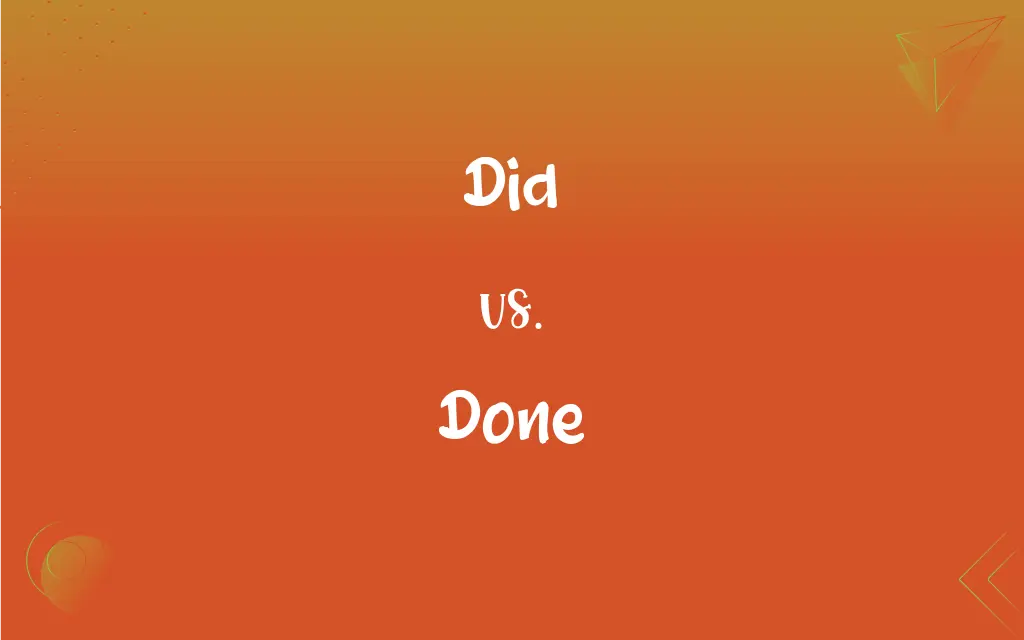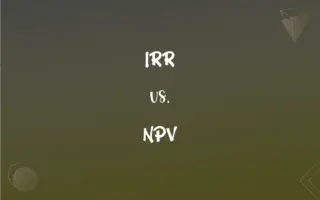Did vs. Done: What's the Difference?
Edited by Aimie Carlson || By Harlon Moss || Updated on October 19, 2023
"Did" is the past tense of "do," while "done" is the past participle form used with auxiliary verbs.

Key Differences
"Did" and "done" both derive from the verb "do," but they are used differently in sentences. "Did" functions as the simple past tense, indicating an action that was completed in the past. "Done," however, is the past participle form, which is typically paired with auxiliary verbs like "have" or "has."
Consider the question "What did you do yesterday?". Here, "did" indicates a past action, specifically inquiring about an activity or event that took place. In contrast, "I have done my homework" employs "done" to signify an action that has been completed in relation to the present.
In negative and interrogative constructions, "did" is commonly used. Examples include "Did you eat the cookies?" or "She didn't go to the store." On the other hand, "done" would be used in statements like "Has she done her chores?" or "The tasks haven't been done yet."
"Did" stands on its own in the past simple tense, without the need for auxiliary verbs. For instance, "She did a great job." Conversely, "done" requires an auxiliary, as in "She has done a great job."
To summarize, while both "did" and "done" stem from the verb "do," their grammatical functions and applications in sentences vary. "Did" is the straightforward past tense form, whereas "done" is the past participle necessitating an auxiliary verb for proper usage.
ADVERTISEMENT
Comparison Chart
Grammatical Form
Simple Past
Past Participle
Auxiliary Requirement
No (e.g., "She did.")
Yes (e.g., "She has done.")
Usage in Questions
Common (e.g., "Did you go?")
Used with auxiliary (e.g., "Has she done it?")
Usage in Negative
Common (e.g., "I didn't eat.")
With auxiliary (e.g., "It hasn't been done.")
Standalone Ability
Yes, can stand alone in past tense
Requires an auxiliary verb
ADVERTISEMENT
Did and Done Definitions
Did
Past tense of "do.
What did you say?
Done
Used to indicate completion.
When you're done, let me know.
Did
Emphasizes a statement in past.
I did complete the assignment on time.
Done
Refers to something finished or decided.
The deal is done.
Did
Used to form questions in past tense.
Did she come to the party?
Done
Past participle of "do."
I've done the dishes.
Did
Indicates a past action or event.
They did a fantastic performance.
Done
Indicates an action's conclusion in relation to the present.
She has done her best.
Did
Used in negative constructions in past tense.
I didn't know the answer.
Done
Used to express being ready or prepared.
Dinner is done and ready to serve.
Did
Past tense of do1.
Done
Past participle of do1.
Did
Past participle of do
Done
Having been carried out or accomplished; finished
A done deed.
FAQs
Can "did" be used without an auxiliary verb?
Yes, "did" stands alone in the simple past tense.
What is the primary function of "did" in a sentence?
"Did" is the past tense of the verb "do" and indicates a past action or event.
Does "done" always require an auxiliary verb?
Yes, "done" typically requires an auxiliary verb like "has" or "have."
Can "did" be used to form negative sentences?
Yes, e.g., "She didn't go to the store."
Which is used in the sentence: "She _____ her work." – "did" or "done"?
"She did her work."
Can "did" and "done" be used interchangeably?
No, they have distinct grammatical functions.
Is "done" an adjective in "I am done"?
Yes, it functions as an adjective meaning finished or completed.
How is "done" typically used in sentences?
"Done" is the past participle of "do" and is used with auxiliary verbs like "have" to indicate completion.
Which verb form follows "did"?
The base form, e.g., "Did you eat?"
How is "done" used in questions?
With an auxiliary, e.g., "Has she done her chores?"
How is "done" used to express readiness?
E.g., "The cake is done."
Can "did" be used to emphasize a statement?
Yes, e.g., "I did finish the job."
Is "done" used in passive constructions?
Yes, with an auxiliary, e.g., "The job was done by her."
Can "did" function as a main verb?
Yes, as in "She did a great job."
Which is correct: "I done it" or "I did it"?
"I did it" is correct.
What is the interrogative form using "done"?
It's formed with an auxiliary, e.g., "Have you done the task?"
Which is correct: "She has did it" or "She has done it"?
"She has done it" is correct.
What's the form for past simple negative with "do"?
"Didn't," e.g., "I didn't do it."
Is "did" used in present tense?
No, "did" is exclusively past tense.
How do you form the negative with "done"?
With an auxiliary, e.g., "I haven't done it."
About Author
Written by
Harlon MossHarlon is a seasoned quality moderator and accomplished content writer for Difference Wiki. An alumnus of the prestigious University of California, he earned his degree in Computer Science. Leveraging his academic background, Harlon brings a meticulous and informed perspective to his work, ensuring content accuracy and excellence.
Edited by
Aimie CarlsonAimie Carlson, holding a master's degree in English literature, is a fervent English language enthusiast. She lends her writing talents to Difference Wiki, a prominent website that specializes in comparisons, offering readers insightful analyses that both captivate and inform.































































